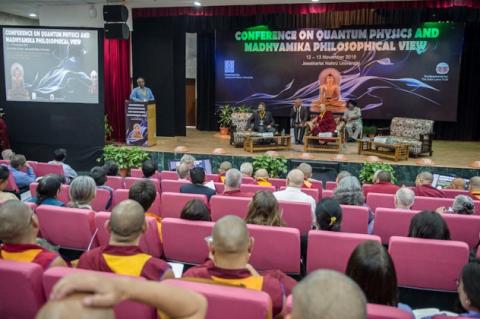Quantum Physics & Madhyamika Philosophy
With over 30 years of serious discussion with scholars of Cosmology, Neurobiology, Quantum Physics and Psychology, he said, “For scientists, they were introduced to mind, emotion and to very subtle level, relation between mind and brain. For us, we were introduced to thorough explanations of matters, cosmology and big bang.”
Taking pride in the Nalanda teachings as the source of Tibetan Buddhism, he said that comparatively Indian ancient psychology are more advanced than the western psychology. And out of all the Buddhist countries and millions of Buddhist, only Tibetans have managed to keep Nalanda traditions intact, he said.
He recalled his encounter with the great Indian physicist, Raja Ramanna, 20 years ago. He said, “He (Rammana) then told me Quantum Physics maybe new to the world but Nagarjuna, a great Nalanda scholar, has mentioned the concept of Quantum Physics in his writings 2000 years ago. This similarity in the two led to discussions with many physicists.” He also reminded that Madhyamika philosophy is an ancient Indian philosophy that “we (Tibetans) have simply learned and it is ‘Indian treasure’.”
Saddened by incidents of killing in the name of religion, which he said should be a source of love and compassion, he stressed that these man-made problems won’t be solved with technology, money or force. “Therefore, it is a collective responsibility of 7 billion people of the world to build a happy and compassionate world.” “Now we need a method to bring conviction in 7 billion human being’s mind that compassionate mind is immensely beneficial to oneself and to build harmonious family, happy society and finally happy humanity,” he said.
He also added religion for centuries have worked hard and made tremendous contribution but was inadequate. “We need a secular way to promote these inner values for our own interest and interest of the humanity. The best solution for happy humanity is warm heartedness.”
Tenzin Monlam

